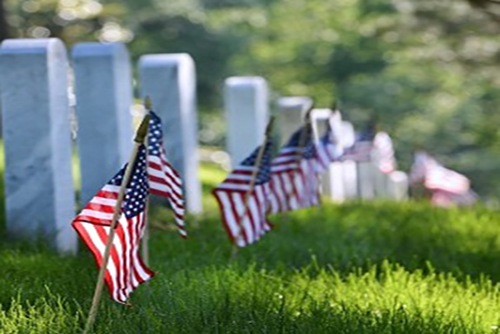Note from Senior Managing Editor Christina Grieves: For Americans, there are few days more poignant than Memorial Day, and the holiday is especially bittersweet this year amid the challenges and uncertainty of the coronavirus pandemic. Today, we’re focusing on the real meaning of this day of commemoration as Alexander Green reflects on the sacrifices that so many people have made – and continue to make – so that we can live freely. We wish all of you a safe and happy holiday!
Some time ago, a friend and former colleague was going through a difficult divorce. (Is there any other kind?)
He didn’t want to separate from his wife, and he hated being apart from his two young daughters. In the midst of this, he walked into work one day and was suddenly and unceremoniously fired from his job.
That evening, he went home and took his own life.
It was a terrible shock to everyone who knew him – and a tragic loss, especially for his girls, who were still in grade school.
I was out of town when I received the call delivering the grim news. I felt awful that I hadn’t been there to offer some consolation.
Although I don’t know what, if anything, I could have done to change his mind, I often imagine I would have simply listened and maybe offered a few words about Viktor Frankl and “the last human freedom.”
Born in 1905, Frankl was an Austrian neurologist and psychiatrist. He was also a Holocaust survivor.
In 1942, Frankl, his wife and his parents were deported to the ghetto of Theresienstadt. From there, he was eventually sent to Türkheim, a concentration camp not far from Dachau.
His wife was shipped to the Bergen-Belsen concentration camp, where she died. His mother and father were sent to Auschwitz, where they too were killed.
After three years, Frankl was liberated by American forces in April 1945. He later wrote a world-famous book about his experience titled Man’s Search for Meaning.
In the book, Frankl described the terrible physical and psychological indignities inflicted on him and his fellow inmates in the camps. But he also wrote movingly about a particular form of spiritual heroism – what he called “the last of the human freedoms”:
We who lived in concentration camps can remember the men who walked through the huts comforting others, giving away their last piece of bread. They may have been few in number, but they offer sufficient proof that everything can be taken from a man but one thing: the last of the human freedoms – to choose one’s attitude in any given set of circumstances.
The dignified way these men and women bore their sufferings was a magnificent inner achievement. Few of us will ever deal with circumstances as tragic as those experienced by Frankl and millions of his fellow Jews at the hands of the Nazi regime.
It’s not just a matter of thinking positively. Yes, dealing successfully with difficult circumstances is partly about bringing the right attitude to bear.
But Frankl also argues that genuine spirituality is not merely the product of right thinking or meditation. It comes from right action. And he offers us a general guideline: “Live as if you were living already for the second time and as if you had acted the first time as wrongly as you are about to act now.”
Frankl calls this emphasis on both attitude and responsibility “the categorical imperative.”
Following it isn’t always easy. Occasionally, life hands us circumstances so dire that nothing practical can be done. (Think of a loved one with a terminal illness.) Sometimes the best we can do is simply play the hand we’re dealt.
Still, it is our choice how we play it.
As Frankl writes…
We must never forget that we may also find meaning in life even when confronted with a hopeless situation, when facing a fate that cannot be changed. For what then matters is to bear witness to the uniquely human potential at its best, which is to transform a personal tragedy into a triumph, to turn one’s predicament into a human achievement. When we are no longer able to change a situation… we are challenged to change ourselves.
Good investing,
Alex
